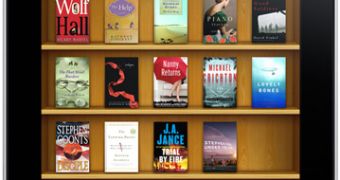Some are reluctant to believe Steve Jobs’ claims that iBooks and iPad had captured 22% of the electronic book market in June, especially TNW which says that thriller writer Joe Konrath is seeing far more success with Amazon Kindle sales.
The Next Web points out to a June statement coming from Steve Jobs when the Apple CEO claimed to have captured 22% of the ebook market with the release of its tablet computer and the iBooks application.
It points out to a post by Joe Konrath, a thriller author based in Chicago, suggesting Mr. Jobs did nothing more than to sustain his distortion field with that statement.
“Publishers might be looking at enriched or enhanced ebooks as their new big-ticket items to replace hardcovers,” Konrath writes, “But the major ebook retailer, Amazon, isn't set up for video.”
“Kindle isn't even able to do color yet,” he shares empathically.
“That leaves Apple, and according to my numbers Apple is a very small part of the ebook market. I sell 200 ebooks a day on Kindle. On iPad, I sell 100 a month,” the writer reveals.
And while enriched ebooks are attractive, they’re expensive, “and I don't see the money pouring in yet,” Konrath stresses.
“But if print goes the way of the dodo, publishers will have to rely on ebooks. Plain old non-enriched ebooks,” he relates.
“We might be looking at the beginning of the end of print,” he adds, later on in his blog post.
According to Konrath, “people are bemoaning this”, and are saying that they love print books, that they never toss their old hardcovers away, that they don’t run out of batteries, and that ereaders are fragile and too expensive.
Some even cite the smell of paper books as a plus, the writer shares.
But, as Konrath puts it, “It doesn't matter what writers, publishers, readers, and bookstores say they want … It matters what they're doing.”
The reality is, “Publishers are publishing fewer books, dropping authors, and seem to be pushing forward with ebooks with no real business plan,” Konrath elaborates.
He then gives the iPad another blow, explaining that, although the device is capable of offering a great reading experience, few people are using the Apple tablet for reading.
“They price their ebooks too high, give authors too small a royalty, and are adding movies that can only be played on devices that people aren't using to read on, like the iPad,” he observes.
Some studies, however, have shown that the iPad is the preferred reading device among many.
Read Konrath’s full synopsis here.

 14 DAY TRIAL //
14 DAY TRIAL //